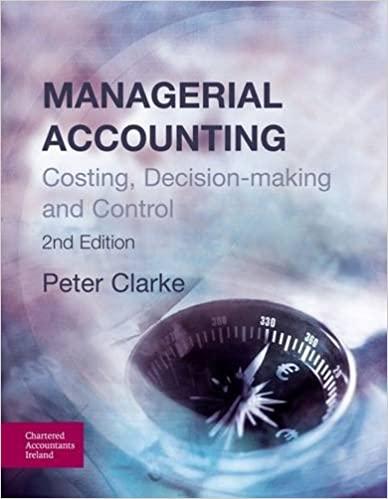Please focus on the particular question listed here. only provide answer to the question indicated here. I do not need help with anything else The
Please focus on the particular question listed here. only provide answer to the question indicated here. I do not need help with anything else
The Falco Group is a holding company with majority ownership of several business-to-business and business-to-consumer firms. The companys flagship consumer holding is the wholly-owned Falco Scooter Company. It makes and sells two scooter models: the City-100 and the Super-300.
The City-100 model has a maximum speed of 50 mph; consequently, it is not allowed on most expressways. The higher-end Super-300 uses a larger, more powerful engine and enhanced safety systems; with its maximum speed of 79 mph, it is approved for expressway riding in many areas.
The market for the City-100 scooter is highly competitive. Many competitors offer essentially identical scooters; the current prevailing market price is $660. At this price, Falco can sell any number of City-100s (our current annual estimate is 5,000 6,000 unit sales).
The market for the Super-300 model is an oligopoly; Falco expects to sell 1,000 Super-300s per year at the current price of $3,000.
Falco Scooters has a single state-of-the-art assembly facility, where both scooter models are made from components sourced from a small number of suppliers. One of the key strategies of the Falco Group is to strive to maximize capacity utilization. Consequently, the scooter manufacturing facility operates at its maximum practical capacity; the capacity constraint is equipment, measured in machine hours (MHs). The two models are assembled using the same employees and equipment. Increasing equipment capacity at Falco Scooters is not currently an option.
The key difference between the two scooter models is Super-300s more powerful engine. Currently, the engine is purchased from an outside supplier for $300 per unit.
As part of its long-term growth strategy in the business-to-business segment, the Falco Group recently acquired Scorpion Motors a small manufacturer of motorcycle engines. Scorpion Motors makes and sells two engine models: Standard and Deluxe.
Scorpion Motors engine-manufacturing plant operates at its maximum practical capacity; the capacity constraint at the engine plant is skilled labor, measured in direct-labor hours (DLHs). For various legal and strategic reasons, increasing labor capacity at Scorpion Motors is not an option. On the other hand, there is significant equipment excess capacity at Scorpion Motors, but this is not an issue the Falco Group plans to address in the near future. The same employees manufacture both engine models using the same equipment.
The market for the Standard engine is highly competitive; at the prevailing market price of $75, Scorpion Motors can sell any number of Standard engines (our current annual estimate is 20,000 25,000 annual unit sales).
The Deluxe engine is made for a single external customer, MG Motorcycles, under a long-term contract requiring Scorpion to deliver 2,500 Deluxe engines per year. The Deluxe uses a design developed and patented by MG Motorcycles; Scorpion Motors is not allowed to sell this engine to any other client.
A recent review of potential internal synergies revealed that a modified version of the Scorpion Motors Deluxe engine could be successfully used by Falco Scooters for the Super-300, instead of the engine currently bought from the outside supplier. MG Motorcycles agreed to allow Scorpion to make this Modified Deluxe for Falco Scooters for a licensing fee of $30,000 per year. Modifications to make the Deluxe fit on the Super-300 will require additional direct-materials (DM) costs at Scorpion Motors of $30 for each Modified Deluxe. Neither costs nor volumes of the Deluxe units made for MG Motorcycles will be affected.
Additional information, collected from the two divisions normal-absorption reporting systems, is below:
| 2 Selling price$660$3,000Direct Materials (includes engine)$420$1,260Machine Hours14Direct Labor5DLHs @$30per DLH20DLHs @$30per DLHVariable Overhead Allocation$6per DLH$6per DLHFixed Overhead Allocation$9per DLH$9per DLHFalco Scooter Company, per-unit informationCity-100Super-300 |
| Selling price$75$300Direct Materials$15$120Machine Hours13Direct Labor1DLH @$30per DLH2DLHs @$30per DLHVariable Overhead Allocation$15per DLH$15per DLHFixed Overhead Allocation$3per DLH$3per DLHScorpion Motors, per-unit informationStandardDeluxe Falco Scooters divisional managers bonus incentives are tied to the divisions net operating income (NOI, computed using GAAP). For various reasons, the division does not appear to be on track to meet the NOI target needed to earn bonuses for divisional managers. Falco Scooters controller notes that the unit margins on City-100s are so low that the division would increase its NOI if its stops producing and selling City-100s and instead make Super-300s for inventory. a. While City-100s unit contribution margin is low, it is still positive. Conceptually, how can the controllers proposal to stop producing and selling City-100s and instead make Super-300s for inventory provide the division with a higher NOI? b. Comment on the controllers proposal. Are there any problems with this proposal? Is it a good idea from the point of view of the Falco Groups shareholders?
|
Step by Step Solution
There are 3 Steps involved in it
Step: 1

See step-by-step solutions with expert insights and AI powered tools for academic success
Step: 2

Step: 3

Ace Your Homework with AI
Get the answers you need in no time with our AI-driven, step-by-step assistance
Get Started


